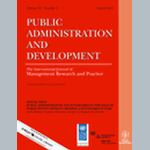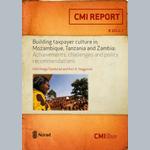Strengthening tax systems in developing countries
In recent years, there has been a growing interest in the centrality of taxation for growth and redistribution. A wide range of bi- and multilateral development agencies, regional development banks and others are now entering an arena that used to be set aside for a few interested parties. The global financial crisis has also made donors more attentive to the effectiveness of aid. They want value for money, also for the money they spend trying to strengthen tax systems in developing countries. So what should be their main concern?
No ‘one size fits all’
A common feature of tax systems in many developing countries is a small number of registered taxpayers. A relatively small number of medium sized and large enterprises account for the majority of tax revenue. Typically, less than 400 enterprises make up for 80 percent of domestic tax revenues. This means that there is a large potential for higher domestic revenue, but a broadening of the tax system needs to be carefully administered to avoid discontent.
-The challenge for many developing countries is not only to tax more, but to tax a larger number of citizens and enterprises more consensually and to encourage constructive state-citizen engagement around taxation, says Odd-Helge Fjeldstad, senior researcher at the Chr. Michelsen Institute and Research Director at the International Centre for Tax and Development.
For donors, this implies a focus on building effective tax systems through tax policy reforms, capacity building of the tax administration and improved accountability. According to Fjeldstad, the sustainability of donor support requires that the government of each country must take the lead and define the needs. Efforts and priorities have to be tailored to the economic, political and institutional factors in each country. Sadly, there is no magic bullet reform that fits all.
Tax reform is also a matter of perceptions.
-Donors need to recognize that taxation is not just an administrative task for governments and citizens. It is also about politics and power, and the way that authority is exercised in a country through its formal and informal institutions, says Fjeldstad.
Tax systems can potentially contribute to shape accountability relationships between the state and citizens. For taxation to have a positive effect on accountability and to secure that tax issues are part of the public political agenda, taxes must be ‘felt’ by a majority of the population.
-While donors and tax practitioners seem to acknowledge the importance of these issues, they have yet to be translated into a clear-cut governance focused tax reform in practice, says Fjeldstad.
The importance of broadening the tax revenue base and building a taxpayer culture should not be underestimated according to Fjeldstad. If taxpayers feel that their tax payments are wasted, they will resist paying.
-Programmes to improve public expenditure management and increase efficiency in the delivery of public services go hand in hand with tax reform, he says.
Addressing remaining challenges
There are many examples that the donors’ contributions to reform the tax agenda in developing countries actually work. During the last two decades, the tax system in many countries has become simpler, more transparent and less costly to enforce.
-Tax administration at the central government level is also improved in many countries. Rwanda and South Africa are outstanding examples in this respect, but also Ghana, Mozambique and Tanzania have developed more effective revenue administrations with donor support, says Fjeldstad.
But there are problems, and donors need to keep these in mind supporting tax reforms in developing countries. The challenges are biggest in the poorest and most dependent countries.
-Extensive tax exemptions are granted to investors. This practice is increasing, and undermines the legitimacy of the tax system. Tax evasion and avoidance are massive in growing sectors like natural resource extraction, tourism, bank and finance sectors, and telecommunications, says Fjeldstad.
Local government tax systems are often ignored in the tax reform work despite the fact that they affect more people than national tax systems. Donor support to strengthen sub-national tax systems is required. Also, the renewed interest in taxation in itself brings new challenges for donors.
-Since an increasing number of development agencies and international organisations are getting involved in tax related work, it is important for all involved parties to secure complementarity and avoid similar projects, says Fjeldstad.
Publications

Tax and development: Donor support to strengthen tax systems in developing countries

Taxation and development in Africa. How aid can strengthen tax systems

Taxation and development: a review of donor support to strengthen tax systems in developing countries
